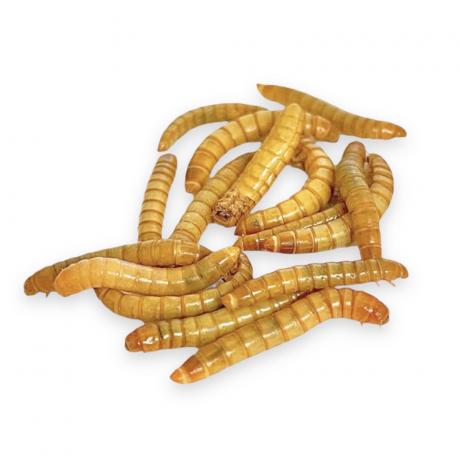

Mealworms are a great source of food for our reptiles, avian pets, poultry and fish. People also often feed these to wild birds, especially during the nesting season. They are full of protein and are easy to store. Available in 2 different sizes.
Mealworms are the larvae of the Yellow Mealworm Beetle, a species of Darkling Beetle. They grow to around 25mm in length. Their shiny segmented bodies are golden brown in colour and their heads and tip of the tail is dark brown. Near to the head they have small legs, allowing them to move around and cling on to food. Once they reach their maximum size, they will begin to darken before starting to pupate; later emerging as beetles which darken to black upon maturing.
Thought to have originated in the Mediterranean region, but due to its popularity as feeder insects the Mealworm is present in many areas of the world as an introduced species.
Our Mealworms are bred in a modern, ethical facility in the UK, reared on high end food - meaning that they arrive to you fresh and in excellent health as standard.
On arrival, your Mealworms may appear immobile if temperatures are low but will soon become active when warm again. They will be delivered in ventilated pre-pack tubs or bulk bags depending on the quantity you order with bran to keep them dry. Our bulk Mealworms are sent in hessian sacks for your convenience. On arrival, you must pour the contents immediately into a larger, well ventilated tub as the worms will eventually chew through the material; the sack is for transport purposes only.
Mealworms are best stored at room temperature around 15-24°C, this will keep them fresher for longer.
We recommended both gut loading and hydrating your feeder insects for at least 24 hours prior to offering them as prey. Feeding the insects nutrient rich foods, prior to feeding them to your animal ensures maximum nutrition is being transferred from your feeder insects to your reptile, amphibian or arachnids. Dehydrated insects will not readily absorb nutrients and become weak, lethargic and die off prematurely. For feeding, potato or carrot offers basic nutrition and moisture. The best option however is to offer them one of the specialist high quality insect diets; It makes perfect sense that well fed, hydrated feeder insects are far healthier and more nutritious for your pet.
As a food source, they are high in protein, fat and amino acids; this makes them a fulfilling part of any meal for many species. We recommend feeding as part of a varied diet, offering twice per week for reptiles alongside other types of livefood. As with any livefood, variety is the key to providing a well balanced, nutritious diet.
Mealworms are the ideal size for feeding to geckos, bearded dragons, frogs and many other species. As they are slower moving than some other feeder insects, they are also readily enjoyed by many species of arachnids, mammals such as meerkats, fish, chickens and many species of wild birds.